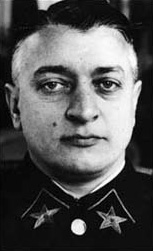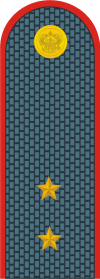|
Mikhail Demichev
Mikhail Afanasyevich Demichev (; 1885 – November 19, 1937) was a Red Army ''komdiv'' (division commander). He fought in the Imperial Russian Army in World War I before going over to the Bolsheviks in the subsequent Civil War. He was a recipient of the Order of the Red Banner. During the Great Purge, he was arrested on August 9, 1937, and later executed. After the death of Joseph Stalin, he was rehabilitated in 1956. Early life, World War I, and Russian Civil War Demichev was born in 1885 to a Russian peasant family in the village of Kuprino, Karachevsky Uyezd, Oryol Governorate. After graduating from the village school, he went to work in Yekaterinoslav, becoming a roller and paperboy at a printing house. Drafted into the Imperial Russian Army in 1908, Demichev served with the 14th Little Russia Dragoon Regiment as a private before rising to non-commissioned officer in 1911. He entered a school for ''praporshchik''s (ensigns) at the division headquarters in 1913, but did not ... [...More Info...] [...Related Items...] OR: [Wikipedia] [Google] [Baidu] |
Demichev
Demichev (Russian: Демичев) is a Russian masculine surname originating from the verb ''demit'' (''to cheat''); its feminine counterpart is Demicheva. The surname may refer to the following notable people: *Mikhail Demichev (1885–1937), Red Army division commander *Pyotr Demichev Pyotr Nilovich Demichev (; 10 August 2010) was a Soviet politician. He was deputy Chairman of the Presidium of the Supreme Soviet from 1986 to 1988 and Minister of Culture from 1974 to 1986. He was a deputy Politburo member from 1964 until his ... (1918–2010), Soviet and Russian politician References {{surname Russian-language surnames ... [...More Info...] [...Related Items...] OR: [Wikipedia] [Google] [Baidu] |
Oryol Governorate
Oryol Governorate () was an administrative-territorial unit ('' guberniya'') of the Russian Empire and the Russian SFSR, which existed from 1796 to 1928. Its seat was in the city of Oryol. Administrative division Oryol Governorate consisted of the following uyezds (administrative centres in parentheses): * Bolkhovsky Uyezd (Bolkhov) * Bryansky Uyezd (Bryansk) * Dmitrovsky Uyezd ( Dmitrovsk) * Yeletsky Uyezd (Yelets) * Karachevsky Uyezd (Karachev) * Kromskoy Uyezd (Kromy) * Livensky Uyezd (Livny) * Maloarkhangelsky Uyezd ( Maloarkhangelsk) * Mtsensky Uyezd ( Mtsensk) * Orlovsky Uyezd (Oryol Oryol ( rus, Орёл, , ɐˈrʲɵl, a=ru-Орёл.ogg, links=y, ), also transliterated as Orel or Oriol, is a Classification of inhabited localities in Russia, city and the administrative center of Oryol Oblast, Russia, situated on the Oka Rive ...) * Sevsky Uyezd ( Sevsk) * Trubchevsky Uyezd ( Trubchevsk) References Governorates of the Russian Empire States and te ... [...More Info...] [...Related Items...] OR: [Wikipedia] [Google] [Baidu] |
Rehabilitation (Soviet)
Rehabilitation (, transliterated in English as ''reabilitatsiya'' or academically rendered as ''reabilitacija'') was a term used in the context of the former Soviet Union and the post-Soviet states. Beginning after the death of Stalin in 1953, the government undertook the political and social restoration, or political rehabilitation, of persons who had been repressed and criminally prosecuted without due basis. It restored the person to the state of acquittal. In many cases, rehabilitation was posthumous, as thousands of victims had been executed or died in labor camps. The government also rehabilitated several minority populations which it had relocated under Stalin, and allowed them to return to their former territories and in some cases restored their autonomy in those regions. Post-Stalinism epoch The government started mass amnesty of the victims of Soviet repressions after the death of Joseph Stalin. In 1953, this did not entail any form of exoneration. The government ... [...More Info...] [...Related Items...] OR: [Wikipedia] [Google] [Baidu] |
Case Of Trotskyist Anti-Soviet Military Organization
The Case of the Trotskyist Anti-Soviet Military Organization, also known as the Military Case or the Tukhachevsky Case, was a 1937 secret trial of the high command of the Red Army, a part of the Great Purge. Defendants The Case was a secret trial, unlike the Moscow Show Trials. It is traditionally considered one of the key trials of the Great Purge. Marshal Mikhail Tukhachevsky and the senior military officers Iona Yakir, Ieronim Uborevich, Robert Eideman, August Kork, Vitovt Putna, Boris Feldman, and Vitaly Primakov (as well as Yakov Gamarnik, who committed suicide before the investigations began) were accused of anti-Soviet conspiracy and sentenced to death; they were executed on the night of June 11 to 12, 1937, immediately after the verdict delivered by a Special Session (специальное судебное присутствие) of the Supreme Court of the Soviet Union. The Tribunal was presided over by Vasili Ulrikh and included marshals Vasily Blyukh ... [...More Info...] [...Related Items...] OR: [Wikipedia] [Google] [Baidu] |
Military Collegium Of The Supreme Court Of The Soviet Union
The Military Collegium of the Supreme Court of the Soviet Union () was created in 1924 by the Supreme Court of the Soviet Union as a court for the higher military and political personnel of the Red Army and Fleet. In addition it was an immediate supervisor of military tribunals and the supreme authority of military appeals. During 1926–1948 the Chairman of the Collegium was Vasiliy Ulrikh. The role of the Military Collegium drastically changed after June 1934, when it was assigned the duty to consider cases that fell under Article 58, counter-revolutionary activity. During the Great Purge of 1937–1938 the Military Collegium tried relatively prominent figures, usually based on the lists approved personally by Joseph Stalin, the majority of Article 58 cases having been processed extrajudicially by NKVD troikas. In particular, the Military Collegium conducted the major Soviet show trials. The Collegium was also involved in a subsequent trial of Polish General Leopold ... [...More Info...] [...Related Items...] OR: [Wikipedia] [Google] [Baidu] |
Tolmachev Military-Political Academy
Tolmachyov, Tolmachov or Tolmachev () feminine: Tolmachyova or Tolmacheva is a Russian patronymic surname mening "son of ''tolmach''", where "tolmach" is an archaic Russian word for "interpreter". * Aleksandr Tolmachyov (other), multiple persons *Anastasia Tolmacheva, Russia-born Romanian biathlete * Dmitri Tolmachyov (born 1996), Russian football player * Nikolay Tolmachyov * Oleg Tolmachev (1919–2008), Soviet ice hockey player and coach * Tatyana Tolmachova (1907–1998), Soviet figure skater and coach *Viktor Tolmachev * Vitaliy Tolmachyov * Vladimir Tolmachyov (footballer) (born 1996), Russian football player * Vladimir Tolmachyov (politician) (1887–1937), Soviet politician and statesman *Tolmachevy Sisters Anastasiya and Maria Andreyevna Tolmacheva (born 14 January 1997, Kursk), known as the Tolmachevy Sisters (), are identical twin singers and actresses from Kursk, Russia. Aged nine, they won the Junior Eurovision Song Contest 2006 with their s ..., Avasta ... [...More Info...] [...Related Items...] OR: [Wikipedia] [Google] [Baidu] |
Frunze Military Academy
The M. V. Frunze Military Academy (), or in full the Military Order of Lenin and the October Revolution, Red Banner, Order of Suvorov Academy in the name of M. V. Frunze (), was a military academy of the Soviet and later the Russian Armed Forces. Established in 1918 to train officers for the newly formed Red Army, the academy was one of the most prestigious military educational institutions in the Soviet Union. At first titled the General Staff Academy of the Red Army, taking on a similar role to its pre-revolutionary predecessor, the Imperial Nicholas Military Academy, it was renamed the Military Academy in 1921 and then the M. V. Frunze Military Academy in 1925, honouring Mikhail Frunze, who had been a commandant of the academy. It became a higher staff college with the addition of courses for senior command officers in the 1930s, before these were transferred in 1936 to the newly formed Military Academy of the General Staff. By this time many of the Red Army's most senior c ... [...More Info...] [...Related Items...] OR: [Wikipedia] [Google] [Baidu] |
8th Cavalry Division (RSFSR)
*
{{disambiguation ...
Eighth is ordinal form of the number eight. Eighth may refer to: * One eighth, , a fraction, one of eight equal parts of a whole * Eighth note (quaver), a musical note played for half the value of a quarter note (crotchet) * Octave, an interval between seventh and ninth * Eighth octave C, a C note * Eighth Lake, a lake by Inlet, New York See also * 1/8 (other) * 8 (other) * The 8th (other) * The Eighth Day (other) The Eighth Day may refer to: Observances * Octave (liturgy) * Shemini Atzeret, the eighth day of the Jewish Feast of Tabernacles * The eighth day (Christian) Film * ''Gattaca'', a 1997 film with working title ''The Eighth Day'' * On the Eight ... [...More Info...] [...Related Items...] OR: [Wikipedia] [Google] [Baidu] |
Praporshchik
(, , ) is a rank used by the Russian Armed Forces and a number of former communist states. The rank is a non-commissioned officer's and is equivalent to in the corresponding navies. It is usually equivalent to warrant officer class 1 or sergeant major in English-speaking armies. Within NATO forces, the rank is rated as OR-7 or OR-8. Russia is a rank in the Russian military, also used in other uniformed services of the Russian government such as the police. It was a junior officer rank in Imperial Russia, but was abolished following the Russian Revolution. In 1940, the rank was restored as a separate career group between non-commissioned officers and officers. Imperial Russia was originally an Oberoffizer rank, as first introduced in Streltsy New Regiments. The name originates from Slavonic ''prapor'' (прапор), meaning flag; the ''praporshchik'' was a flag-bearer in Kievan Rus troops. In the New Regiments of the Streltsy and the "new army" of Peter the Great, '' ... [...More Info...] [...Related Items...] OR: [Wikipedia] [Google] [Baidu] |
Non-commissioned Officer
A non-commissioned officer (NCO) is an enlisted rank, enlisted leader, petty officer, or in some cases warrant officer, who does not hold a Commission (document), commission. Non-commissioned officers usually earn their position of authority by promotion through the enlisted ranks. In contrast, Officer (armed forces), commissioned officers usually enter directly from a military academy, officer training corps (OTC) or Reserve Officers' Training Corps (ROTC), or officer candidate school (OCS) or officer training school (OTS), after receiving a post-secondary degree. The NCO corps usually includes many grades of enlisted, corporal and sergeant; in some countries, warrant officers also carry out the duties of NCOs. The naval equivalent includes some or all grades of petty officer. There are different classes of non-commissioned officers, including junior (lower ranked) non-commissioned officers (JNCO) and senior/staff (higher ranked) non-commissioned officers (SNCO). Functio ... [...More Info...] [...Related Items...] OR: [Wikipedia] [Google] [Baidu] |




